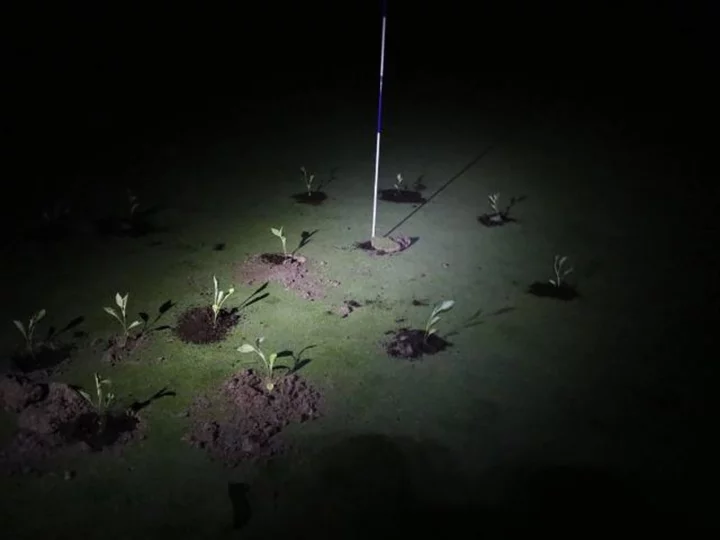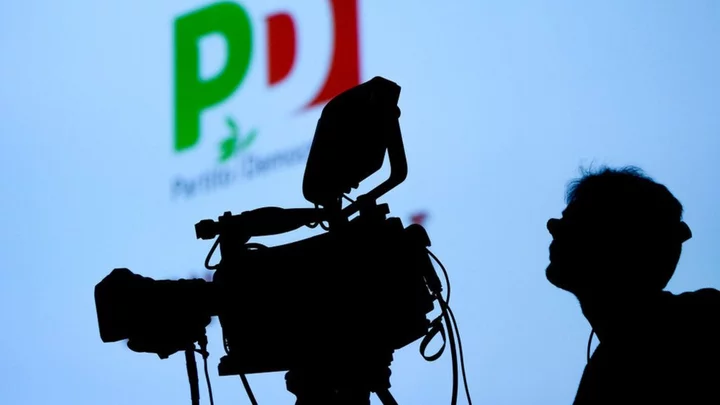
Japan will soon release Fukushima radioactive water into the ocean. How worried should we be?
Japan will soon begin releasing treated radioactive water into the ocean following approval from the United Nations' nuclear watchdog for a controversial plan that comes 12 years after the Fukushima nuclear meltdown.
2023-07-05 11:23

South Korea Salvages North’s Spy Satellite in Intelligence Win
South Korea salvaged a failed North Korean spy satellite from the sea, giving it a rare direct look
2023-07-05 11:18

Climate activists block golf course holes with seedlings and cement to protest water use
Climate activists have targeted 10 golf courses around Spain, plugging up holes to protest the amount of water used to maintain these courses as the country is gripped by a severe drought.
2023-07-04 23:57

Canada media guide
An overview of the media in Canada, including links to broadcasters and newspapers.
2023-07-04 23:45

Grammys CEO on new AI guidelines: Music that contains AI-created elements is eligible. 'Period.'
In June, the Recording Academy announced a series of changes to the forthcoming Grammy Awards to better reflect an evolving music industry, including new AI protocols
2023-07-04 21:20

Roundup: Nina Agdal, Logan Paul Engaged; Anthony Edwards Lands Huge Extension; Home Run Derby Contestants Revealed
Nina Agdal and Logan Paul are engaged, Anthony Edwards got a huge extension, MLB Home Run Derby contestants revealed and more in the Roundup.
2023-07-04 19:20

Blur 'pull out of festival headline slot after Dave Rowntree injury'
Blur have pulled out of a headline slot at France’s Festival Beauregard this week after drummer Dave Rowntree picked up a knee injury, just days ahead of their Wembley Stadium shows on Saturday (08.07.23) and Sunday (09.07.23).
2023-07-04 15:27

Dolly Parton says she doesn't want to live on through AI after she dies: 'When I'm gone, I want to fly with it'
Dolly Parton isn't interested in living on through artificial intelligence.
2023-07-04 08:24

The Universe has sped up to an extreme level, scientists confirm
The universe went in “extreme slow motion” at its beginning, and has dramatically sped up since, scientists have found. The discovery, predicted by Einstein’s general theory of relativity, was finally confirmed after scientists observed the universe soon after the Big Bang. Einstein’s theory suggests that we should be able to see the distant universe, when it was much older than it is today, running much more slowly. But scientists have not been able to actually look that far and confirm the theory. Now scientists have used bright quasars as a sort of space clock, allowing them to measure time when the universe was much older than it is today. “Looking back to a time when the universe was just over a billion years old, we see time appearing to flow five times slower,” said Geraint Lewis from the University of Sydney, lead author on the new research. “If you were there, in this infant universe, one second would seem like one second – but from our position, more than 12 billion years into the future, that early time appears to drag.” Professor Lewis and other researchers gathered data from 200 quasars for the research. Quasars are very active supermassive black holes that sit in the middle of early galaxies, and hence provide a reliable way to look back at a much younger universe. Previous researchers have done the same using supernovae, or massive exploding stars. Those are useful but they are also difficult to see at the very very long distances of the early universe, meaning that the confirmation was limited only to about half the age of the cosmos. Now by using quasars scientists were able to look much further back, to just a tenth of the age of the universe, when it was only a billion years old. “Thanks to Einstein, we know that time and space are intertwined and, since the dawn of time in the singularity of the Big Bang, the universe has been expanding,” Professor Lewis said. “This expansion of space means that our observations of the early universe should appear to be much slower than time flows today. “In this paper, we have established that back to about a billion years after the Big Bang.” The work is described in a new paper, ‘Detection of the cosmological time dilation of high-redshift quasars’, published in Nature Astronomy. Read More Astronomers discover ‘shooting stars’ on the Sun Tonight’s ’supermoon’ will be biggest full moon of 2023 so far – here’s how to see it Euclid: UK-backed space mission takes off to uncover mysteries of dark universe Astronomers discover ‘shooting stars’ on the Sun Tonight’s ’supermoon’ will be biggest full moon of 2023 so far – here’s how to see it Euclid: UK-backed space mission takes off to uncover mysteries of dark universe
2023-07-03 23:30

Harvard Legacy Admissions Targeted in Minority Groups’ Complaint
Harvard University was accused by minority groups of violating the Civil Rights Act of 1964 by giving preferential
2023-07-03 22:54

Italy media guide
An overview of the media in Italy, including links to broadcasters and newspapers.
2023-07-03 22:15

Matty Healy gives shout-out to good friend Lewis Capaldi at Finsbury Park gig
Matty Healy sent a sweet message to Lewis Capaldi at his concert at the weekend.
2023-07-03 18:27
